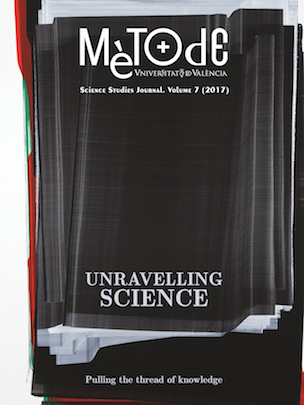The science of difference: The invisibility of women in health sciences
DOI:
https://doi.org/10.7203/metode.7.8155Palabras clave:
gender and health, differential morbidity, gender perspective, equality, differences Resumen
Resumen
Women remained invisible in health sciences until the late twentieth century because they were not included in the cohorts used in researched studies. Thanks to the work done by different groups of feminist researchers, we were able to visualise the need to change those paradigms. But while gender perspectives have allowed us to research new aspects of science, gender has sometimes contributed to rendering female-specific health issues as invisible. For women to be treated equally, their differences have to be recognised, precisely so that the equal right of both sexes to quality of life can be defended. Therefore, the science of difference should be included in research and taught in all health science specialisations.
 Descargas
Descargas
 Citas
Citas
Díaz, C. (2002). Conversational heuristic as a reflexive method for feminist research. International Review of Sociology, 12(2), 249–255. doi: 10.1080/0390670022000012477
Fausto-Sterling, A. (2006). Cuerpos sexuados. Barcelona: Melusina.
Freedman, L. S., Simon, R., Foulkes, M. A., Friedman, L., Geller, N. L., Gordon, D. J., & Mowery, R. (1995). Inclusion of women and minorities in clinical trials and the NIH Revitalization Act of 1993 – The perspective of NIH clinical trialists. Controlled Clinical Trials, 16(5), 277–285.
Harding, S. (1996). Ciencia y feminismo. Madrid: Morata. (Original work published in 1986).
Keller, E. F. (2004). What impact, if any, has feminism had on science? Journal of Bioscience, 29(1), 7–13. doi: 10.1007/BF02702556
Joel, D., Berman, Z., Tavor, I., Wexler, N., Gaber, O., Stein, Y., … Assaf, Y. (2015). Sex beyond the genitalia: The human brain mosaic. Proceedings of the National Academy of Sciences, 112(50), 15468–15473. doi: 10.1073/pnas.1509654112
Pinn, V. W. (2003). Sex and gender factors in medical studies: Implications for health and clinical practice. Journal of the American Medical Association, 289(4), 397–400. doi: 10.1001/jama.289.4.397
Ritz, S. A., Antle D. M., Côté, J., Deroy, K., Fraleigh, N., Messing, K., ... Mergler, D. (2014). First steps for integrating sex and gender considerations into basic experimental biomedical research. The FASEB Journal, 28(1), 4–13. doi: 10.1096/fj.13-233395
Rosser, S. V. (1986). Teaching science and health from a feminist perspective. A practical guide. New York: Pergamon Press.
Sau, V. (2000). Reflexiones feministas para principios de siglo. Madrid: Horas y HORAS.
Tingen, C., Nagel, J. D., & Clayton, J. A. (2013). Monitoring the implementation of the National Institutes of Health Strategic Plan for Women’s Health and Sex/Gender Differences Research: Strategies and successes. Global Advances in Health and Medicine, 2(5), 44–49. doi: 10.7453/gahmj.2013.051
Tomás, C., Yago, T., Eguiluz, M., Samitier, M. L., Oliveros, T., & Palacios, G. (2014). A tool to assess sex-gender when selecting health research projects. Atención Primaria, 1–8. doi: 10.1016/j.aprim.2014.05.010
Verbrugge, L. M. (1985). Gender and health: An update on hypotheses and evidence. Journal of Health and Social Behavior, 26(3), 156–182.
Valls-Llobet, C. (2006). Mujeres invisibles. Barcelona: Debolsillo.
Valls-Llobet, C. (2009). Mujeres, salud y poder. Madrid: Editorial Cátedra.
Descargas
Publicado
Cómo citar
-
Resumen1621
-
PDF 555
Número
Sección
Licencia
Todos los documentos incluidos en OJS son de acceso libre y propiedad de sus autores.
Los autores que publican en esta revista están de acuerdo con los siguientes términos:
- Los autores conservan los derechos de autor y garantizan a Metode Science Studies Journal el derecho a la primera publicación del trabajo, licenciado bajo una licencia de Creative Commons Reconocimiento-NoComercial-SinObraDerivada 4.0 Internacional, que permite a otros compartir el trabajo con un reconocimiento de la autoría del trabajo y citando la publicación inicial en esta revista.
- Se permite y se anima a los autores a difundir sus trabajos electrónicamente a través de páginas personales e institucionales (repositorios institucionales, páginas web personales o perfiles a redes profesionales o académicas) una vez publicado el trabajo.





